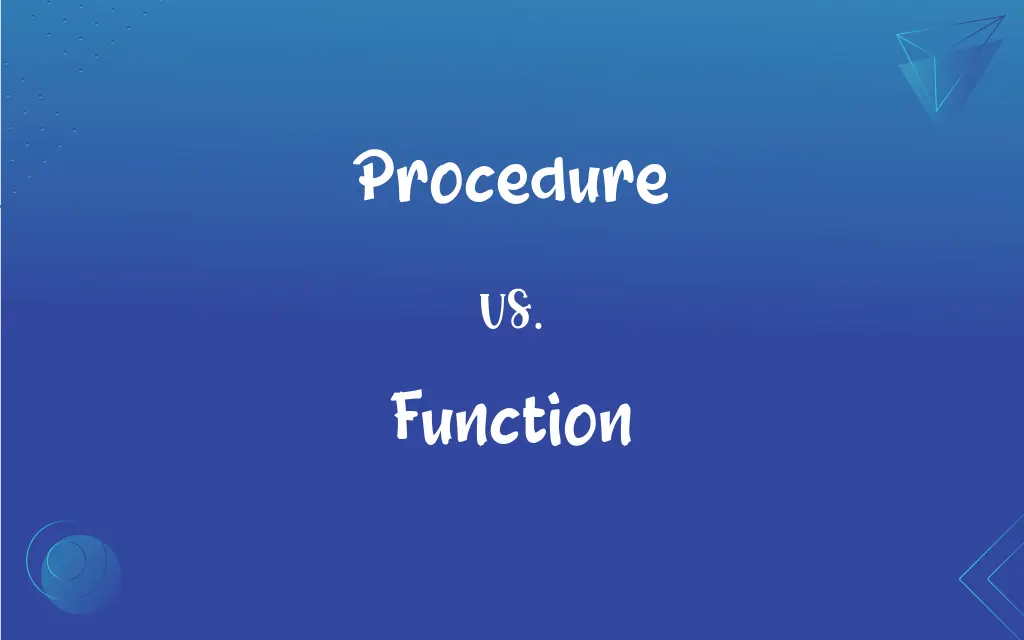Procedure vs. Function: What's the Difference?
Edited by Aimie Carlson || By Harlon Moss || Updated on October 13, 2023
Procedure performs a task, doesn’t return a value. Function performs a task, returns a value. Both are used in programming and procedural task execution.

Key Differences
A procedure, in the realm of computer programming and process management, is a set of instructions or steps which are undertaken sequentially to accomplish a specific task. On the other hand, a function also consists of a set of instructions designed to perform a specific task but with the additional capability to return a value upon the execution of those instructions. Therefore, a procedure might modify the state of an object or system without necessarily reporting the outcome, while a function typically provides feedback in the form of a return value to the calling program.
Procedures are often utilized in programming when a specific set of tasks needs to be performed repeatedly throughout a code base without generating a result that is used within the larger program. Functions, meanwhile, are engaged when a task needs to be performed repetitively and the outcome of that task (the return value) is utilized in various parts of the program. Thus, one might imagine a procedure as a worker who completes a task silently, and a function as a worker who announces the result of their labor.
When delving into various programming languages like PL/SQL, it becomes evident that procedures are essential for executing code that manages or modifies data within databases without necessarily fetching or returning data. Functions, on the flip side, often find their utility in performing calculations, conversions, or data retrieval, wherein the resultant data is utilized by the calling program or function to inform further processing or logic execution.
It is also notable that in the context of general language use, a procedure refers to a set, sequence, or accepted method of doing something, often following a fixed, stepwise approach. Contrarily, a function, in a more general sense, refers to a role or purpose that something is designed to perform. Hence, while both words suggest action, a procedure leans towards methodical action, whereas a function implies purposeful action.
While both procedures and functions in a programmatic context imply methodical execution of instructions, their implications, and usages diverge notably when considering their interaction with and impact on the rest of the program or system. A nuanced understanding of these differences is crucial for efficient and effective programming, ensuring that tasks are executed, and data is managed and utilized optimally.
ADVERTISEMENT
Comparison Chart
Return Type
Doesn’t return a value.
Returns a value.
Usage Context
Often used for tasks affecting program or system state.
Commonly used for calculative tasks with returned results.
In General Language
Refers to a set sequence or method of performing something.
Pertains to the role or purpose something is designed to fulfill.
Parameter Passing
Can utilize OUT parameters to return data.
Typically returns data using the return statement.
Invocation
Can be called from a trigger or another procedure.
Can be called from a procedure, trigger, or another function.
ADVERTISEMENT
Procedure and Function Definitions
Procedure
In programming, a procedure is a subroutine that does not return a value.
His code included a procedure to sort the array’s values.
Function
A function represents the natural purpose or intended use of an item or concept.
The primary function of scissors is to cut materials like paper or cloth.
Procedure
A procedure is a predetermined method of accomplishing a task or set of tasks.
The scientist followed the procedure to achieve accurate results.
Function
A function can refer to a large, formal, or official social event or ceremony.
The ambassador hosted a function to celebrate the national day.
Procedure
A procedure may refer to a set protocol in a medical or business setting.
The medical team adhered to the emergency procedure diligently.
Function
In programming, a function is a block of code designed to perform a particular task and often return a value.
He wrote a function to calculate the square root of a number.
Procedure
Legally, a procedure might relate to the formal steps or stages of a legal process.
The lawyer explained the procedure for filing a claim to the client.
Function
In mathematics, a function is a relation between a set of inputs and a set of possible outputs.
The function f(x) = x + 2 defines an output value for each input value x.
Procedure
A procedure can be a sequence of actions conducted in a certain order.
The cooking procedure was outlined clearly in the recipe.
Function
In biology, function refers to the particular role or utility of an organ or part.
The function of the heart is to pump blood throughout the body.
Procedure
A manner of proceeding; a way of performing or effecting something
Standard procedure.
Function
A person's role or occupation
In my function as chief editor.
Procedure
A series of steps taken to accomplish an end
A medical procedure.
Evacuation procedures.
Function
(Biology) The physiological activity of an organ or body part
The heart's function is to pump blood.
FAQs
What is a procedure?
A procedure is a set of ordered steps or instructions designed to perform a specific task.
How is a function defined?
A function is a block of reusable code that performs a specific task and often returns a value.
Do functions always return a value?
Typically, functions return a value, but some programming languages allow void functions, which do not return a value.
Can a function call a procedure?
Yes, a function can call a procedure within its code.
Can functions and procedures have parameters?
Yes, both functions and procedures can accept parameters to utilize within their operations.
What is the main difference between procedures and functions in PL/SQL?
In PL/SQL, procedures do not return values, while functions must return a value.
Can a procedure return a value?
Generally, procedures do not return values but may modify variables or objects.
Can a function exist within another function?
Yes, many programming languages support nested functions.
Can procedures and functions be overloaded?
Yes, in many programming languages, procedures and functions can be overloaded to work with different parameter types.
What's an example of a procedure in daily life?
A cooking recipe can be considered a procedure as it outlines steps to achieve a specific outcome without necessitating feedback.
How is a function invoked in programming?
Functions are invoked by calling their name followed by parentheses, with any required parameters inside.
How does a mathematical function differ from a programming function?
While both map inputs to outputs, mathematical functions have strict output consistency, whereas programming functions may not.
What is a recursive function?
A recursive function is a function that calls itself within its own definition.
What is the meaning of "function" in a non-programming context?
Outside programming, "function" refers to the purpose of something or a social event.
Can functions modify variables outside their scope?
Some languages allow functions to modify external variables, while others restrict them to their local scope.
What is a higher-order function?
A higher-order function is a function that takes one or more functions as arguments, returns a function, or both.
Are there procedural programming languages?
Yes, procedural programming languages like C and Pascal use procedures as fundamental building blocks.
Can a procedure call a function?
Yes, a procedure can call a function and utilize the returned value.
Why use functions in programming?
Functions promote code reuse, improve readability, and enable modular programming.
When might one use a procedure over a function?
One might use a procedure for tasks that don’t require returning a value, like modifying a database.
About Author
Written by
Harlon MossHarlon is a seasoned quality moderator and accomplished content writer for Difference Wiki. An alumnus of the prestigious University of California, he earned his degree in Computer Science. Leveraging his academic background, Harlon brings a meticulous and informed perspective to his work, ensuring content accuracy and excellence.
Edited by
Aimie CarlsonAimie Carlson, holding a master's degree in English literature, is a fervent English language enthusiast. She lends her writing talents to Difference Wiki, a prominent website that specializes in comparisons, offering readers insightful analyses that both captivate and inform.































































